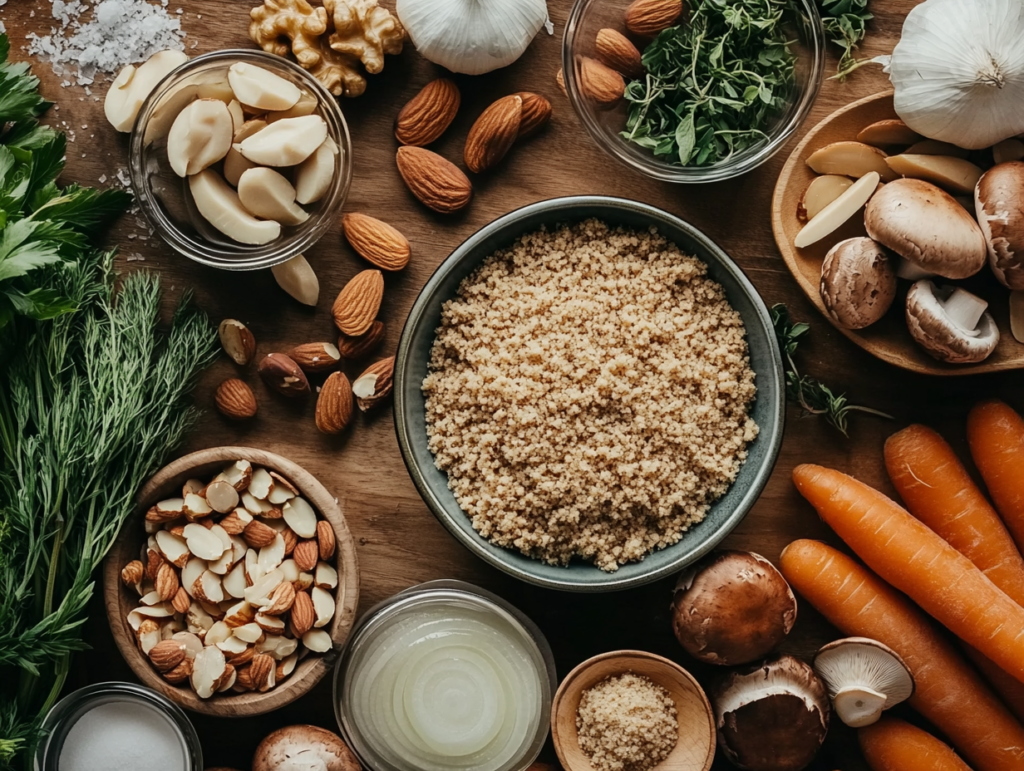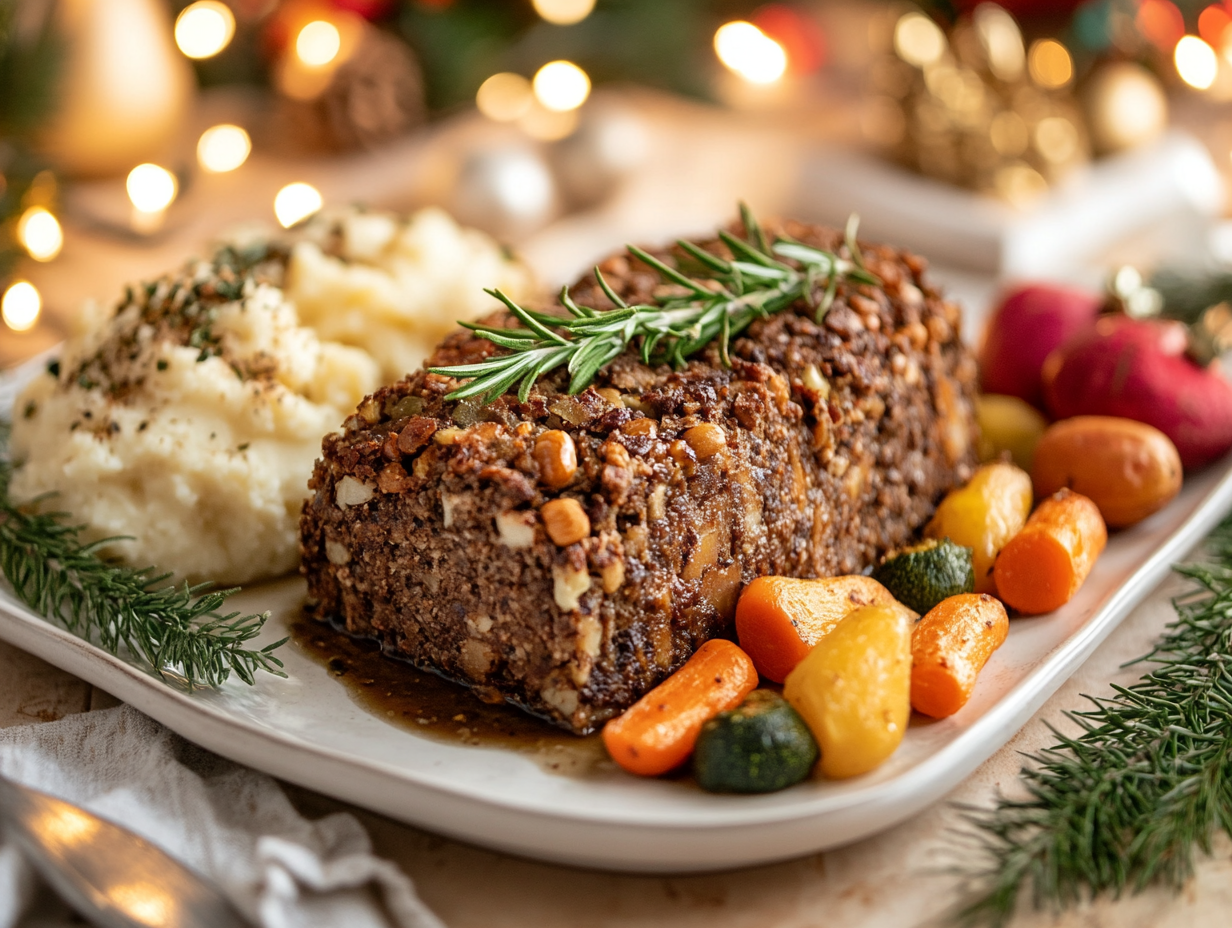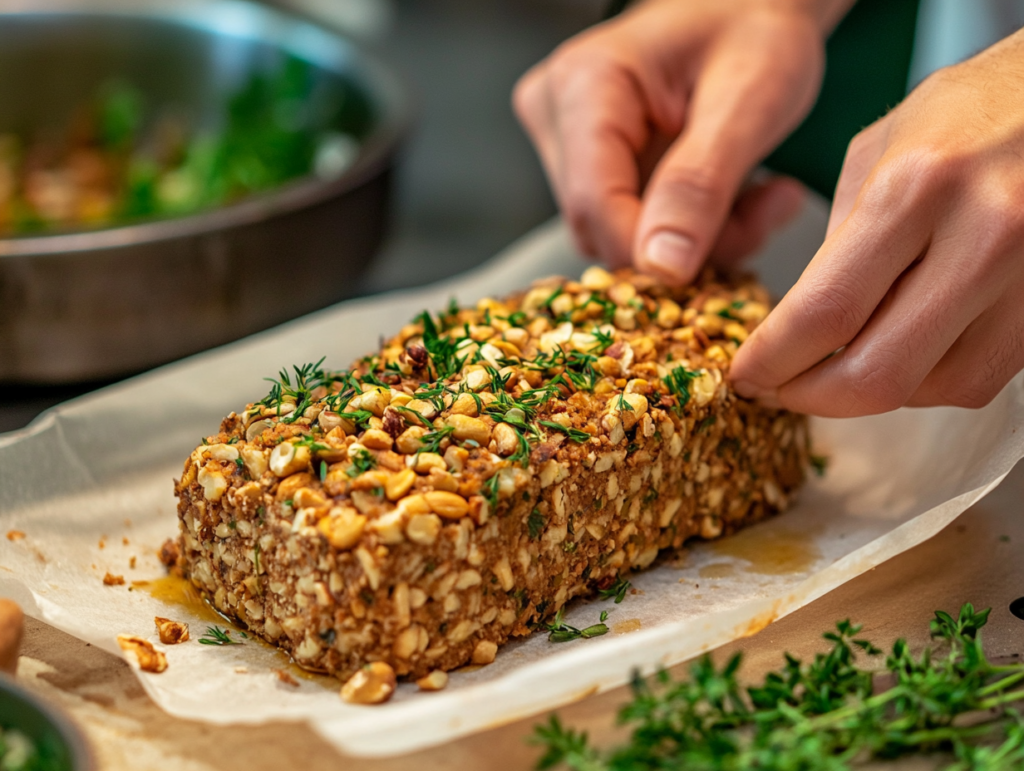Introduction
A Vegetarian Nut Roast is a hearty, flavorful dish perfect for special occasions, festive celebrations, or even weeknight dinners. Packed with nutritious nuts, vibrant vegetables, and aromatic herbs, it serves as a satisfying centerpiece for plant-based meals. This guide will walk you through everything from understanding its nutritional benefits to crafting a perfect nut roast that’s sure to impress. Whether you’re new to vegetarian cooking or a seasoned pro, this recipe offers something for everyone. Let’s dive into the essentials.
For a lighter pairing, try our refreshing Salmon Caesar Salad.
What Is a Vegetarian Nut Roast?
Definition and Origins
A Vegetarian Nut Roast is a savory loaf made primarily from nuts, vegetables, and binding ingredients like breadcrumbs or oats. It’s a staple in vegetarian and vegan cuisines, often served as a main dish during holidays or family gatherings. The dish combines earthy, nutty flavors with a variety of textures, making it a satisfying alternative to traditional roasts.
Why It’s Popular
- Plant-Based Delight:
- Appeals to vegetarians, vegans, and anyone looking for a meat-free option.
- Versatility:
- Adaptable to different tastes with endless possibilities for ingredients and seasonings.
- Nutritional Powerhouse:
- Packed with protein, fiber, and healthy fats, making it as wholesome as it is delicious.
If you’re planning a mixed-diet gathering, consider serving a traditional Turkey in an Electric Roaster alongside this vegetarian centerpiece.
A Brief History of Nut Roasts
- Cultural Significance:
- First introduced as a meat substitute in the 19th century, nut roasts gained popularity among vegetarians during the 20th century.
- Modern Appeal:
- Today, it’s celebrated not just as a meat alternative but as a gourmet dish in its own right, perfect for showcasing the flavors of fresh, natural ingredients.
Nutritional Benefits of a Vegetarian Nut Roast
A Vegetarian Nut Roast is not only delicious but also packed with essential nutrients that contribute to a balanced diet. Its carefully selected ingredients make it a wholesome choice for plant-based eaters and anyone seeking a healthier alternative to traditional meat roasts.
High Protein Content
- Nuts and Legumes:
- The nuts (such as walnuts, almonds, and cashews) and legumes (like lentils or chickpeas) used in a nut roast are excellent sources of plant-based protein.
- This makes the dish ideal for vegetarians or vegans looking to meet their daily protein requirements.
- Complete Protein Options:
- Combining grains (e.g., breadcrumbs or oats) with nuts creates a complete protein, providing all essential amino acids.
Rich in Healthy Fats
- Unsaturated Fats:
- Nuts are loaded with heart-healthy unsaturated fats that help reduce bad cholesterol levels while supporting brain function.
- Almonds and walnuts, in particular, are great sources of omega-3 fatty acids.
- Energy Boost:
- The healthy fats in a nut roast provide sustained energy, perfect for long holiday meals or celebrations.
Packed with Vitamins and Minerals
- Vitamins:
- Carrots and mushrooms, often used in nut roasts, are rich in vitamin A and vitamin D, respectively.
- Leafy herbs like parsley and sage contribute vitamins C and K.
- Minerals:
- Nuts are an excellent source of magnesium, zinc, and selenium, supporting immune function and overall health.
High in Dietary Fiber
- Digestive Health:
- The combination of vegetables, nuts, and oats provides ample dietary fiber, promoting good digestion and a healthy gut.
- Satiating Effect:
- Fiber helps you feel full for longer, making a Vegetarian Nut Roast a satisfying meal that keeps hunger at bay.
Essential Ingredients for the Best Vegetarian Nut Roast
Creating a flavorful Vegetarian Nut Roast starts with choosing the right ingredients and following a thoughtful preparation process. Here’s a detailed guide to crafting the perfect nut roast, step by step.
Selecting the Right Nuts
- Commonly Used Nuts:
- Walnuts: Provide a rich, earthy flavor and a slightly crunchy texture.
- Almonds: Add a mild nuttiness and a satisfying crunch.
- Cashews: Offer creaminess and subtle sweetness.
- Tips for Toasting:
- Lightly toast the nuts in a dry skillet or oven to enhance their natural flavors. Toasting also makes them easier to grind and mix.
Complementary Vegetables
- Vegetable Base:
- Onions, garlic, carrots, and celery form the aromatic foundation of the roast.
- Mushrooms add umami depth and a moist texture.
- Additional Options:
- Bell peppers, spinach, or zucchini can be incorporated for extra color and nutrients.
Binding Agents
- Traditional Binders:
- Eggs are commonly used to bind the ingredients together.
- Vegan Alternatives:
- Use flaxseed meal or chia seeds mixed with water as a plant-based substitute for eggs.
- Breadcrumbs or oats help absorb moisture and maintain structure.
Herbs and Spices
- Essential Herbs:
- Fresh rosemary, thyme, and parsley provide aromatic depth.
- Dried sage adds a touch of warmth.
- Spices:
- Ground nutmeg or smoked paprika can add subtle complexity.
Looking to round out your brunch menu? Pair this savory dish with our sweet and indulgent Cream Cheese Stuffed French Toast Recipe.
How to Prepare a Vegetarian Nut Roast Step by Step
- Chopping and Sautéing:
- Finely chop the vegetables and nuts. Sauté the onions, garlic, carrots, and mushrooms in olive oil until softened.
- Combining Ingredients:
- In a large bowl, mix the sautéed vegetables, chopped nuts, breadcrumbs, herbs, and spices. Add the binding agent and stir until the mixture holds together.
- Molding the Loaf:
- Line a loaf pan with parchment paper and press the mixture firmly into the pan. Smooth the top for an even finish.
- Baking:
- Preheat the oven to 375°F (190°C). Bake the nut roast for 40–50 minutes, or until the top is golden brown and the loaf is firm.
Variations of Nut Roasts
A Vegetarian Nut Roast is incredibly versatile, allowing you to tailor it to your dietary preferences, flavor preferences, or special occasions. Here are some popular variations to try.
Vegan Nut Roast
- Replacing Eggs:
- Use flaxseed meal or chia seeds mixed with water (1 tablespoon of seeds + 3 tablespoons of water per egg).
- Dairy-Free Options:
- Substitute cheese with nutritional yeast for a cheesy, umami flavor.
- Flavor Adjustments:
- Increase the amount of fresh herbs and spices to elevate the flavor.
Gluten-Free Nut Roast
- Gluten-Free Binders:
- Replace breadcrumbs with gluten-free breadcrumbs or rolled oats.
- Cross-Contamination Precautions:
- Ensure all ingredients, including packaged nuts, are certified gluten-free.
Festive Nut Roasts
- Holiday Ingredients:
- Add cranberries or dried apricots for a hint of sweetness.
- Incorporate chestnuts for a rich, seasonal flavor.
- Presentation for the Holidays:
- Shape the nut roast into a wreath or layer it with stuffing for a festive look.
Regional Twists
- Mediterranean Nut Roast:
- Use sun-dried tomatoes, olives, and oregano for a Mediterranean flavor profile.
- Asian-Inspired Nut Roast:
- Incorporate soy sauce, sesame oil, and ginger for a savory, umami-packed dish.
- Indian-Style Nut Roast:
- Add garam masala, turmeric, and curry leaves for a warm and aromatic spin.
Mini Nut Roasts
- Individual Portions:
- Use a muffin tin to create mini nut roasts, perfect for portion control or serving at parties.
- Customization:
- Tailor each mini roast with different fillings, such as cheese, pesto, or chutney.

Cooking Techniques and Tips
Cooking a Vegetarian Nut Roast to perfection requires attention to detail, from baking time to achieving the ideal texture. Here are some tips and techniques to ensure your nut roast is as delicious as possible.
Baking Time and Temperature
- Optimal Settings:
- Preheat the oven to 375°F (190°C).
- Bake the nut roast for 40–50 minutes, or until the top is golden brown and firm to the touch.
- Checking Doneness:
- Insert a skewer or toothpick into the center; it should come out clean when the nut roast is fully cooked.
- Adjusting for Size:
- If you’re making mini nut roasts, reduce the cooking time to 25–30 minutes.
Avoiding Common Pitfalls
- Preventing Dryness:
- Avoid overbaking by monitoring closely during the final 10 minutes.
- Add a splash of vegetable stock or a dollop of tomato paste to the mixture if it seems too dry before baking.
- Ensuring Structure:
- Press the mixture firmly into the loaf pan to help it hold its shape.
- Use a binding agent like eggs, flaxseed meal, or breadcrumbs to prevent crumbling.
Make-Ahead and Storage
- Prepare in Advance:
- Assemble the nut roast up to 24 hours in advance, cover it with plastic wrap, and store it in the refrigerator. Bake it fresh when ready to serve.
- Freezing the Nut Roast:
- Wrap the unbaked or baked nut roast tightly in plastic wrap and aluminum foil. Freeze for up to 2 months. Thaw in the refrigerator overnight before baking or reheating.
Tips for a Perfect Crust
- Enhance the Golden-Brown Finish:
- Brush the top of the nut roast with olive oil or melted vegan butter before baking.
- Sprinkle with breadcrumbs or crushed nuts for added crunch.
- Tenting with Foil:
- If the top begins to brown too quickly, cover it loosely with aluminum foil during the last 10–15 minutes of baking.
Serving Suggestions
A Vegetarian Nut Roast is as much about presentation as it is about flavor. Pairing it with the right sides, sauces, and garnishes ensures it’s the star of your meal, whether it’s a holiday dinner or a weeknight treat.
Accompaniments for Nut Roast
- Classic Side Dishes:
- Roasted Vegetables: Carrots, parsnips, and Brussels sprouts add a colorful, rustic touch.
- Mashed Potatoes: Creamy and buttery, they balance the nut roast’s texture.
- Steamed Greens: Spinach, kale, or green beans offer freshness and contrast.
- Grains and Breads:
- Serve with wild rice pilaf, quinoa, or crusty whole-grain bread for a hearty pairing.
Gravy Options
- Mushroom Gravy:
- A rich, earthy sauce that complements the flavors of the roast perfectly.
- Onion Gravy:
- Slightly sweet and tangy, it pairs beautifully with the nutty flavors.
- Tomato-Based Sauce:
- Adds a tangy kick for a lighter, Mediterranean-inspired meal.
Presentation Ideas
- Plating:
- Slice the nut roast into even portions and arrange them on a platter.
- Use a bed of roasted vegetables or mashed potatoes as a base for the slices.
- Garnishing:
- Sprinkle chopped parsley, rosemary, or thyme over the nut roast for a fresh look.
- Add a drizzle of gravy or sauce just before serving for added elegance.
- Festive Touches:
- Garnish with cranberries, pomegranate seeds, or toasted nuts for a holiday-themed presentation.
Pairing with Beverages
- Refreshing Options:
- Sparkling water with a twist of lemon or lime.
- Herbal teas such as chamomile or mint complement the nut roast’s flavors.
- Non-Alcoholic Ciders:
- Apple or pear cider enhances the dish’s richness while staying light and fruity.
Frequently Asked Questions (FAQs)
Cooking and serving a Vegetarian Nut Roast can come with a few uncertainties, especially if it’s your first time. Here are answers to the most frequently asked questions to help you achieve perfect results every time.
1. What is a nut roast made of?
A nut roast is typically made from a combination of:
- Nuts: Walnuts, almonds, cashews, or hazelnuts.
- Vegetables: Onions, carrots, celery, mushrooms, or zucchini.
- Binding Agents: Eggs, breadcrumbs, oats, or flaxseed meal (for vegan options).
- Herbs and Spices: Fresh herbs like thyme and rosemary, and spices like nutmeg or paprika.
2. Can I freeze a nut roast?
Yes, nut roasts freeze well. To freeze:
- Unbaked Nut Roast: Wrap tightly in plastic wrap and aluminum foil, and freeze for up to 2 months. Thaw overnight in the refrigerator before baking.
- Baked Nut Roast: Allow it to cool completely, then wrap and freeze. Reheat in the oven at 350°F (175°C) for 20–25 minutes.
3. How do I make a vegan nut roast?
To make a vegan nut roast:
- Replace eggs with a flaxseed or chia seed mixture (1 tablespoon seeds + 3 tablespoons water per egg).
- Use nutritional yeast for a cheesy flavor instead of dairy-based cheese.
- Ensure all other ingredients, such as breadcrumbs, are vegan-friendly.
4. What nuts are best for a nut roast?
Popular choices include:
- Walnuts: For a rich, earthy flavor.
- Cashews: For creaminess and a subtle sweetness.
- Almonds: For crunch and mild nuttiness.
- A mix of nuts provides the best texture and flavor.
5. How long does a nut roast keep in the fridge?
- A baked nut roast will keep in the refrigerator for up to 3–4 days. Store it in an airtight container to maintain freshness.
- Reheat slices in the oven or microwave, adding a splash of broth or water to prevent dryness.
6. Can I prepare the nut roast ahead of time?
Absolutely! You can:
- Assemble the nut roast up to 24 hours in advance, cover it, and refrigerate.
- Bake it fresh before serving for the best flavor and texture.
Conclusion
The Vegetarian Nut Roast is a versatile, nutritious, and flavorful dish that deserves a spot at your dining table, whether for festive occasions, casual dinners, or a healthy, plant-based alternative to traditional roasts. By following this guide, you’ve learned everything from its nutritional benefits to preparation techniques and creative variations.
Key Takeaways:
- Nutritious and Satisfying: Packed with protein, fiber, and essential vitamins, the nut roast is both healthy and delicious.
- Highly Customizable: From vegan adaptations to festive twists, the possibilities are endless.
- Perfect for Any Occasion: Whether served with gravy and classic sides or elevated with unique flavors, the nut roast is always a crowd-pleaser.
With its rich flavors and impressive presentation, the Vegetarian Nut Roast is more than just a meat-free option—it’s a dish that can stand proudly as the centerpiece of any meal. Whether you’re hosting guests or cooking for your family, this recipe is sure to become a favorite.
Now, it’s time to head to the kitchen and create your perfect Vegetarian Nut Roast. Enjoy every bite! Let me know if you’d like additional resources like printable recipe cards or visual guides. 😊
Pair it with a classic side dish, a tangy gravy, or even something sweet like our Cream Cheese Stuffed French Toast Recipe to create a memorable feast. Enjoy every bite and celebrate the flavors of plant-based cooking!


